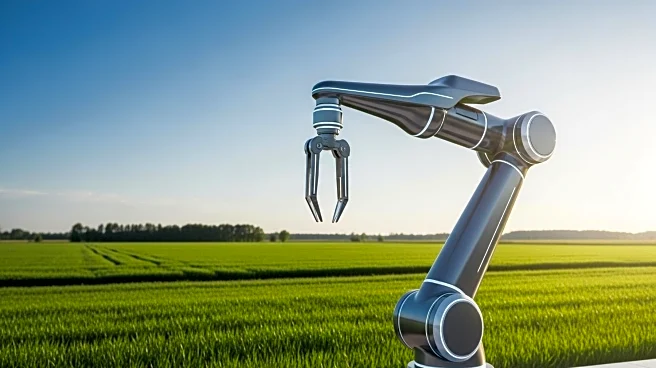What is the story about?
What's Happening?
The U.S. agricultural machinery market is poised for significant growth, driven by technological innovations and increasing demand for precision farming solutions. The market, valued at USD 140 billion in 2020, is projected to reach USD 205 billion by 2028, with a compound annual growth rate (CAGR) of 7% from 2024 to 2031. Key players such as AGCO Corp, Kubota Corp, and Yanmar Co. Ltd. are at the forefront of this expansion, focusing on the development of advanced machinery that enhances productivity, efficiency, and sustainability in farming. Recent developments include the introduction of electric tractors and autonomous machinery, which are expected to transform the industry by promoting eco-friendly practices and addressing labor shortages.
Why It's Important?
The anticipated growth in the U.S. agricultural machinery market is crucial for several reasons. It reflects a broader trend towards mechanization and technological integration in agriculture, which is essential for meeting the increasing global demand for food and biofuels. The adoption of precision agriculture technologies, such as GPS-enabled tractors and AI-powered machinery, is expected to optimize resource use and reduce environmental impact, aligning with sustainability goals. This growth also presents significant opportunities for manufacturers and investors, as the demand for innovative farming solutions continues to rise. The shift towards electrification and automation in agricultural machinery could lead to increased efficiency and reduced operational costs for farmers, ultimately benefiting the agricultural sector and the economy.
What's Next?
As the market evolves, stakeholders can expect continued investment in research and development to enhance the capabilities of agricultural machinery. Manufacturers are likely to focus on integrating advanced technologies such as IoT and data analytics to provide real-time data operations and support effective farm management. Additionally, government grants and subsidies may further encourage the adoption of sustainable farming practices. The market's growth trajectory suggests that the U.S. will remain a key player in the global agricultural machinery industry, with potential expansions into emerging markets.
Beyond the Headlines
The shift towards advanced agricultural machinery also raises ethical and cultural considerations, particularly regarding the impact on rural communities and traditional farming practices. As automation increases, there may be concerns about job displacement and the need for workforce retraining. Moreover, the reliance on technology in agriculture could lead to data privacy and security challenges, necessitating robust regulatory frameworks to protect farmers' interests.















